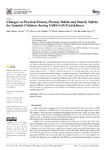Changes in Physical Fitness, Dietary Habits and Family Habits for Spanish Children during SARS-CoV-2 Lockdown

Use this link to cite
http://hdl.handle.net/2183/29427Collections
- Investigación (FEDU) [938]
Metadata
Show full item recordTitle
Changes in Physical Fitness, Dietary Habits and Family Habits for Spanish Children during SARS-CoV-2 LockdownDate
2021Citation
Ramos Álvarez, O.; Arufe Giráldez, V.; Cantarero Prieto, D.; Ibáñez García, A. Changes in Physical Fitness, Dietary Habits and Family Habits for Spanish Children during SARS-CoV-2 Lockdown. Int. J. Environ. Res. Public Health 2021, 18, 13293. https://doi.org/10.3390/ijerph182413293
Abstract
[Abstract] Background: habits related to diet and physical activity in children were modified due to
the lockdown that Spain had between March and June 2019 because of the health crisis caused by
the appearance of SARS-CoV-2. The aim of the study was to know the impact that the lockdown
had on physical fitness values in children aged 11–12. Methods: the study consisted of 50 Spanish
children aged 11–12 (M = 11.40; SD = 0.50), 33 (66%) boys and 17 (34%) girls. Data collection was
performed using the Alpha-Fitness Battery, a validated instrument to assess dietary intake, habits
and practices, and an ad hoc survey to collect sociodemographic data and other information relevant
to the study. Results: there were significant differences (p < 0.05) in the results of fitness variables
measured in the standing long jump, agility speed and aerobic capacity, as well as in the results of
maximal oxygen uptake (VO2 max) between, before and after lockdown in both boys and girls. No
significant differences were found in measurements of right and left hand grip (p > 0.05). Conclusions:
there is evidence of a significant impact of SARS-CoV-2 lockdown on physical fitness values in boys
and girls aged 11–12.
Keywords
SARS-CoV-2 lockdown
Physical fitness
Dietary habits
Family habits
Physical activity
Spanish children
Physical fitness
Dietary habits
Family habits
Physical activity
Spanish children
Editor version
Rights
Atribución 4.0 Internacional






